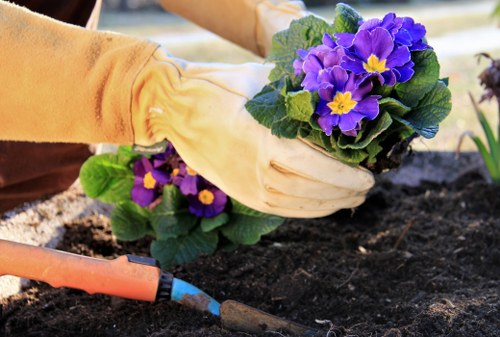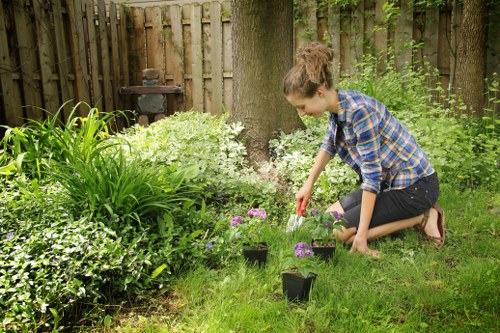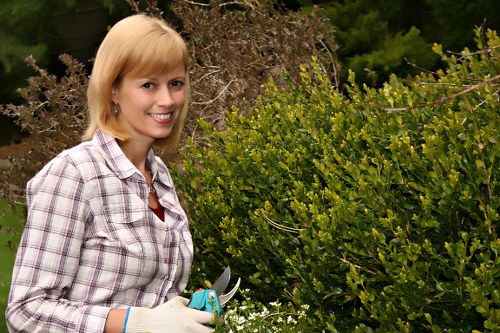Comprehensive Guide to Garden Maintenance in Forest Gate
Introduction to Garden Maintenance

Maintaining a beautiful garden in Forest Gate requires dedication, knowledge, and the right set of tools. Whether you're a seasoned gardener or just starting out, understanding the fundamentals of garden maintenance can transform your outdoor space into a lush, vibrant oasis.
Forest Gate's unique climate and soil conditions present both challenges and opportunities for gardeners. From the diverse plant varieties that thrive in the area to the specific maintenance techniques required, this guide will help you navigate the essential aspects of garden care in this locale.
In this article, we will explore various strategies and tips to keep your garden healthy and attractive all year round. From soil preparation and planting to pruning and pest control, we've got you covered.
Soil Preparation and Improvement

One of the most critical aspects of garden maintenance is ensuring that your soil is fertile and well-structured. Forest Gate's soil can vary, so it's important to conduct a soil test to determine its pH level and nutrient content.
Based on the results, you may need to amend your soil with organic matter such as compost or well-rotted manure. Adding these materials can improve soil aeration, drainage, and nutrient retention, providing a healthy foundation for your plants.
**Regularly testing and amending your soil** ensures that your garden remains productive and resilient against pests and diseases. Consider incorporating cover crops during the off-season to further enhance soil quality.
Plant Selection and Planting Techniques

Choosing the right plants is vital for successful garden maintenance in Forest Gate. Select species that are well-suited to the local climate and soil conditions. Native plants, in particular, are often more resilient and require less maintenance.
When planting, pay attention to the spacing and depth requirements of each species. Proper planting techniques can prevent root competition and ensure that each plant has enough space to grow and thrive.
**Incorporate a mix of perennials and annuals** to provide continuous color and interest throughout the year. Additionally, consider incorporating flowering shrubs and trees to add structure and height to your garden.
Watering and Irrigation

Efficient watering practices are essential for maintaining a healthy garden. In Forest Gate, with its varying rainfall patterns, it's important to establish a reliable irrigation system that meets the needs of your plants.
Drip irrigation systems are highly recommended as they deliver water directly to the plant roots, reducing water waste and minimizing the risk of fungal diseases. Additionally, installing rain barrels can help collect and store rainwater for later use.
**Water your garden early in the morning or late in the evening** to reduce evaporation and ensure that plants receive adequate moisture. Regularly monitor soil moisture levels to avoid overwatering or underwatering.
Pruning and Trimming

Pruning is a vital maintenance task that helps promote healthy growth and maintain the desired shape of your plants. Proper pruning techniques can enhance air circulation, reduce disease incidence, and encourage the production of flowers and fruits.
Different plants require different pruning methods. For instance, flowering shrubs may need to be pruned after they bloom, while fruit trees benefit from winter pruning to remove dead or diseased branches.
**Regularly inspect your plants** for signs of overgrowth or damage and address them promptly. Sharp, clean tools should be used to make precise cuts that minimize stress to the plant.
Weed Control and Pest Management
Weeds compete with your plants for nutrients, water, and sunlight, making them a common nuisance in garden maintenance. Effective weed control involves a combination of preventive measures and manual removal techniques.
Mulching your garden beds can suppress weed growth by blocking sunlight and maintaining soil moisture. Additionally, hand-pulling weeds or using a hoe can help keep them in check without the need for chemical herbicides.
**Integrated Pest Management (IPM)** is a sustainable approach to controlling garden pests. This method includes monitoring pest populations, encouraging beneficial insects, and using natural or organic treatments when necessary.
Fertilizing and Nutrient Management
Providing your plants with the right nutrients is crucial for their growth and development. Fertilizing your garden in Forest Gate involves understanding the specific needs of your plants and applying fertilizers accordingly.
Organic fertilizers, such as compost tea or bone meal, release nutrients slowly and improve soil health over time. Synthetic fertilizers can provide a quick nutrient boost but should be used sparingly to prevent soil degradation.
**Conduct regular soil tests** to determine nutrient deficiencies and adjust your fertilization schedule as needed. Ensuring balanced nutrition helps your plants resist diseases and thrive in their environment.
Lawn Care and Maintenance
A well-maintained lawn can significantly enhance the overall appearance of your garden. Lawn care in Forest Gate includes mowing, aerating, and fertilizing to keep the grass healthy and green.
Mowing at the right height ensures that the grass remains dense and resilient against weeds and drought. Aerating your lawn helps improve soil structure, allowing air, water, and nutrients to reach the roots more effectively.
**Regular fertilization and overseeding** can address thin or bare spots, promoting a thick and lush lawn. Additionally, proper lawn care practices can reduce the need for excessive watering and chemical treatments.
Seasonal Garden Maintenance

Each season brings unique challenges and opportunities for garden maintenance. Adapting your care routine to the changing weather ensures that your garden remains healthy and vibrant throughout the year.
In spring, focus on planting new blooms and preparing garden beds for the growing season. Summer requires diligent watering and pest control, while autumn involves clearing fallen leaves and preparing plants for winter.
**Winter maintenance** may include protecting sensitive plants from frost, pruning dormant shrubs, and planning for the upcoming spring. By staying proactive, you can maintain a thriving garden regardless of the season.
Garden Tools and Equipment

Having the right tools is essential for efficient garden maintenance. Invest in high-quality equipment that suits your gardening needs and makes tasks easier to manage.
Basic tools include a sturdy shovel, garden gloves, pruning shears, a watering can or hose, and a wheelbarrow. For more advanced maintenance, consider tools like a lawn mower, aerator, and a compost bin.
**Regularly maintain and clean your tools** to extend their lifespan and ensure they perform optimally. Proper storage away from the elements can also prevent rust and damage.
Landscaping Ideas for Forest Gate Gardens

Enhancing your garden's aesthetics through thoughtful landscaping can create a welcoming and visually appealing outdoor space. Incorporate various elements such as pathways, water features, and decorative plants to add interest.
Consider using native plants and flowers that complement the natural surroundings of Forest Gate. Stone or gravel pathways can define different areas, while water features like fountains or ponds add a sense of tranquility.
**Incorporate sustainable practices** by using recycled materials, promoting biodiversity, and reducing water usage. Thoughtful landscaping not only beautifies your garden but also supports the local ecosystem.
Professional Garden Maintenance Services
While DIY garden maintenance can be rewarding, sometimes enlisting professional help ensures that your garden receives the best care possible. Professional garden maintenance services in Forest Gate offer expertise and efficiency, saving you time and effort.
Experts can provide tailored solutions based on your garden's specific needs, including custom landscaping, specialized pruning, and advanced pest management. They also have access to high-quality tools and materials that may not be readily available to homeowners.
**Hiring a professional** can help maintain your garden's health and beauty, allowing you to enjoy a stunning outdoor space without the added workload.
Eco-Friendly Gardening Practices
Adopting eco-friendly gardening practices not only benefits your garden but also contributes to environmental sustainability. Implementing green techniques can reduce your garden's carbon footprint and promote a healthier ecosystem.
Use organic fertilizers and pest control methods to minimize chemical usage. Incorporate composting to recycle garden waste and enrich your soil naturally.
**Implementing sustainable watering practices**, such as rainwater harvesting and drip irrigation, conserves water and ensures that your plants receive adequate moisture without wastage.
Conclusion and Final Tips
Maintaining a garden in Forest Gate is a fulfilling endeavor that enhances your home's beauty and provides a serene retreat. By following the essential maintenance practices outlined in this guide, you can ensure that your garden remains healthy, vibrant, and thriving throughout the year.
Remember to stay informed about the specific needs of your plants, adapt to seasonal changes, and consider professional services when necessary. With dedication and the right approach, your Forest Gate garden can be a source of joy and pride for years to come.
Contact us today to learn more about our garden maintenance services and take the first step towards a stunning outdoor space.

